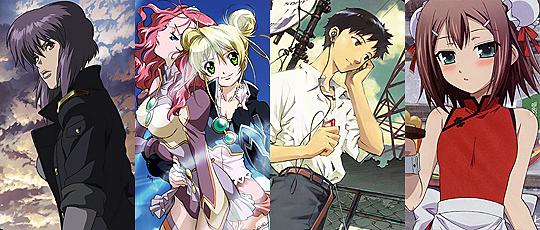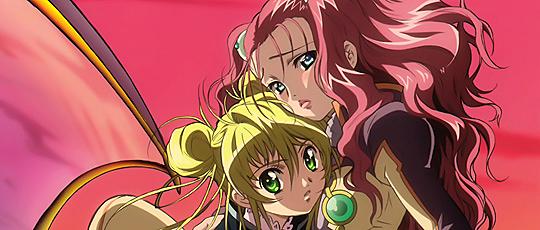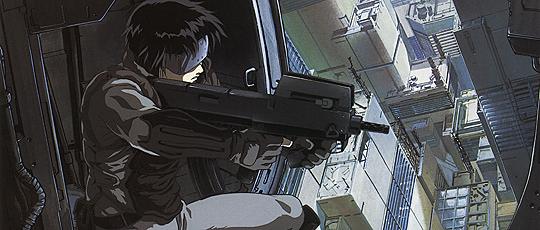A lot of anime deal with identity, but in different ways: whether it is the all-encompassing, driving force behind the movie and series extravaganzas that are Ghost in the Shell and Evangelion or as an undercurrent to more prevalent themes like with Guts in Berserk or Faye in Cowboy Bebop, it is fair to say that many different anime use identity as at least part of their narrative thrust. Even looking at disparate, popular shows like Bleach and Naruto reveals a simplistic version of the theme with the push to become strong and protect - a topic that is an essay in itself. It's only when investigating beyond the obvious that it becomes apparent identity is prevalent in so many different genres of anime that it begins to reflect how they were conceived and upon the creators themselves.
Always pitched as the beautiful young maiden who is then revealed to be male, traps play to the strengths of animation as well as the formative feelings of the audience. There is more variance in cross-dressing treatment throughout anime with the scale starting in the "for laughs" region with the most recent and high-profile being Hideyoshi in Baka to Test to Shokanju and Aoi in Kaichou wa Maid-sama!, through to more thoughtful examinations such as Kei in Moyashimon which passes over non-events such as Haruhi from Ouran High School Host Club. Gender itself is a brutally complex issue that is easy to send a politically correct person mad with possibilities. When people who have undergone gender reassignment surgery or suffer from gender identity disorder are asked their gender, would they answer genetically, physically, mentally or spiritually? The last point is complicated in anime by fantasy elements which allows for "female" spirits to reside within male bodies, commonly seen in in female-orientated (yaoi) works such as Angel Sanctuary or more recently Uragiri wa Boku no Namae o Shitteiru.
The elephant in the room among all of these however is the highly regarded Simoun which plays with expectations by featuring a bevy of female protagonists but constructing the world around a choice: the choice of females to remain so or to convert and become male. The narrative is beautifully structured around this and naturally explores how this affects the inhabitants of a society that, if the series' biology is similar to our familiar mammalian one, necessitates males to procreate but requires that the pilots of the craft within the story remain gender ambiguous. Questions such as whether the pre-choice people can be referred to as female or whether they remain androgynous until their decision is made are rife, and it is telling that the decision to chose their gender comes when they are seventeen, commonly the final stages of puberty. Many European languages have trouble with gender being so intrinsically tied to both people's and even object's delineation as binary male or female. The possibilities blossoming from such a hook are immense and undercut many long-held ideas of romance and identity because it forces thinking around preconceived notions rather than funnelling them through those filters.
Simoun and many others still retain the duality of genders though and rely on the discord between them - males taking on traditionally feminine clothing and mannerisms, females being more assertive and domineering and so forth. Ghost in the Shell, both the movies and the stunning Standalone Complex series, on the other hand take an entirely different view and remove gender entirely by divorcing humans from their bodies. Motoko is the prime example of this being both feminine in her curvaceous appearance and some of her mannerisms, but in a typically male position of authority and pragmatism. We learn that Motoko was biologically female in childhood but the way Batou casually suggests she should change into a male body for increased strength highlights how flippantly cyborgs view gender when the possibility of reproduction is removed. Cyborg and artificial reproduction is something the first movie digs into, but Ghost in the Shell touches upon many facets of identity.
Most presciently is the concept of individualism within a homogeneous society, one that is highly interconnected and increasingly amorphous; how does a single person differentiate themselves? The latter is a question that is at the core of identity: how am I different from everyone else? How do I define me? They are weighty questions and Motoko, again, probes them most poignantly in the first movie when she wonders whether simply having human brain cells lends her individuality, especially in the face of the Puppet Master. Batou picks up a different thread in 2nd GIG when his arm is destroyed by Hideo Kuze: mentioning to Togusa that his new arm doesn't feel like it's part of him yet - the successive thought being that it eventually will despite being an initially impersonal object. GITS goes further with topics such as artisan face sculptors, essentially commoditising individuality by making only the rich able to afford a unique face, the proletariat forced to used mass-market identical ones.
Covering physical, mental and sometimes national identity, Ghost in the Shell is a tour-de-force when it comes to the topic, however it is Evangelion which makes identity its raison detre rather than relying on complex political machinations to prevent it from becoming the subject of an auteur's idle hands. Evangelion has no such ideals and indulges itself with the protagonist Shinji, exploring how he comes to terms with himself. He starts as a blank canvas - weak and malleable - yet eventually comes to define himself through his Eva; without it he hypothesises, he would simply disappear as no one would have a use for him. It's no coincidence that Asuka and Rei suffer from a similar lack of ego but it is the contentious final two episodes of the series which explore some of the most complex issues around his psyche. The formless protagonist is a common archetype for narratives, most often seen in the form of amnesia penned by lazy writers but can be a very potent allegory as seen in Shinji.
So with all of these exploring different aspects of identity, the question is raised as to where it all stems from? Theories vary, but as with most themes the most conspicuous area to examine is the society the creators were brought up in. The directors of the "big three" when it comes to identity - Junji Nishimura for Simoun, Masamune Shirow, Mamoru Oshii and Kenji Kamiyama for the various incarnations of Ghost in the Shell, and Hideaki Anno for Evangelion - all grew up in the 1950's and 60's which is shortly after Japan's defeat in World War 2. Circumstances dictate that they are the first generation born to those who had fought and and lost in that conflict - many who have examined the period (Michael Zielenziger, Alex Kerr, Robert Whiting et. al.) believe that the shock of losing and coming to terms with the defeat created a national identity crisis, one that Japan had not had to deal with before. Compound this with soldiers coming home who have been trained to suppress that ignominy and the home life becomes fastidious and rigidly organised to repel any such minor occurrence of "defeat" happening again.
The result then is a generation who grew up being led into a collective, but one deprived of a strong national direction. In the 1980's Japan elevated itself and became an industrial powerhouse, but this new found pride was dashed once again in the 1990's when the other industrialised countries mutated into an information rather than industry led system and Japan sunk into a protracted depression. Japan had once again "lost" and, to a degree, even now is still searching for a place within the world where it has been overshadowed by other east Asian countries. It's no surprise so many different anime explore the fundamental questions of who they - characters, personalities, locales, nations - are, it's something their creators - authors, directors, character designers - have grown up within and it's only now within the second and third generation that the disaffected undercurrents are beginning to become more pronounced.


